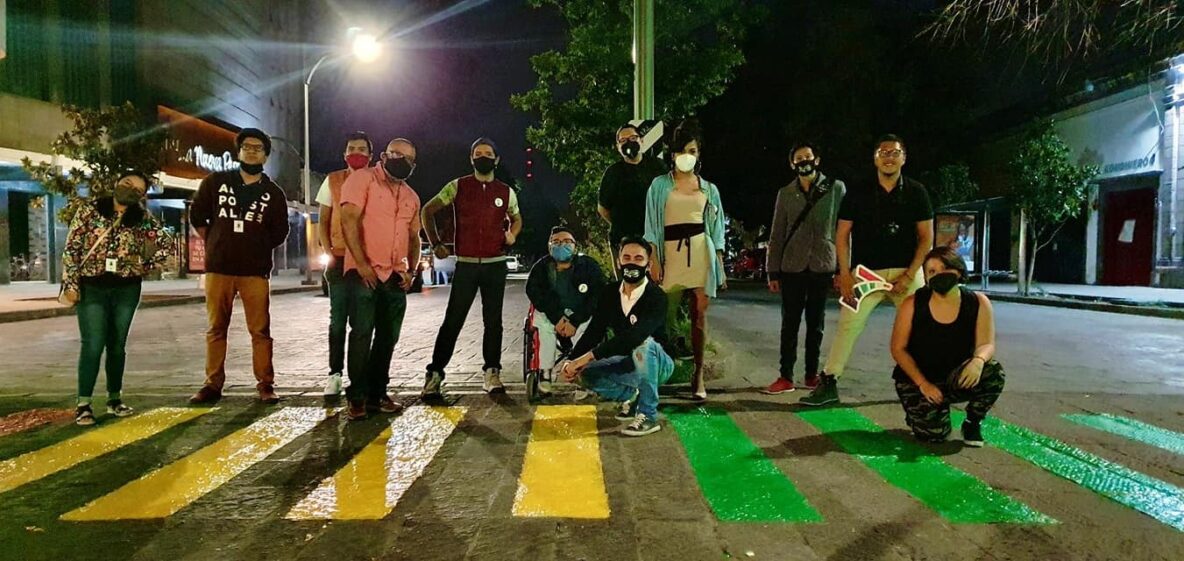As part of our ongoing series sharing COVID-19 response updates from Rise Up Leaders around the globe, Rise Up Leaders in Latin America discuss the effects of the pandemic on their communities and their work to advance gender equity.
By Patzia Martinez, Program Coordinator
The fight against the COVID-19 pandemic is worldwide. Yet in developing countries, the coronavirus is not the only enemy during this global crisis; the lack of resources to guarantee access to education, economic relief, and protection against gender violence looms over Latin American people – especially girls, women, and the civil society organizations that advocate for their rights.
Latin America is full of contrasts and persistent inequalities. Measures like stay-at-home orders can help reduce the spread of COVID-19, but also present their own obstacles, especially for the 60% of the labor market who work in informal commerce, many of whom are girls and women. Remote education is a challenge for many girls who do not have access to the internet or may have to share a computer or tablet with other family members. In many Latin American countries and around the world, cases of gender-based violence have increased during confinement, making it even more difficult for governments and civil society organizations who lack resources to respond effectively.
Despite these adversities, in Guatemala, Honduras, and Mexico, Rise Up Leaders and their organizations are adapting so they can continue to care for and serve their communities while advancing social justice, violence prevention, education, and equity for girls and women in the region.
Leader responses have been edited for length and clarity.
GUATEMALA
Ixchel María José Lucas Adolfo
Advocacy Technician, Red Departamental Las Niñas Lideran in Quetzaltenango
Rise Up Leader since 2010

Red Departamental Las Niñas Lideran delivering cleaning and sanitary supplies in Quetzaltenango and Cantel. Photo courtesy of Red Departamental Las Niñas Lideran.
“Unfortunately, the girls, youth, and women in my community are vulnerable to physical or psychological violence at all times, and this vulnerability has increased during lockdown, as it often means they must spend more time with the perpetrator. Since the majority of women and girls depend on the wages of their husbands or dads, many are afraid to speak up. Because of the lockdown, we cannot leave our homes or meet to propose projects that help the mental and physical health of girls, youth, and women. It is also more difficult to know what is going on in some cases of violence because of a lack of communication. To combat and prevent violence in this time of confinement, we launched a campaign with the support of social networks such as YouTube, Facebook, WhatsApp, and Instagram.”
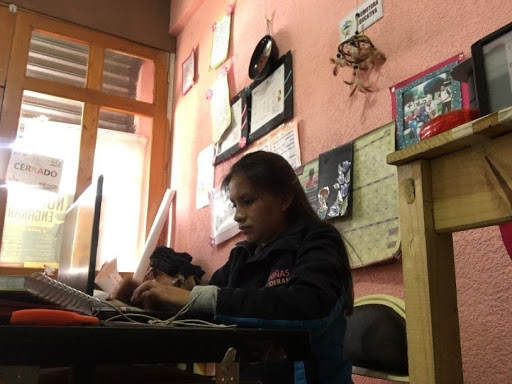
Rise Up Leader Ixchel working at her computer. Photo provided by Ixchel María José Lucas Adolf.
Tracie Paola Méndez Saravia
General Director, Asociación Civil Colectivo para la Participación de la Infancia y Juventud
Rise Up Leader since 2013
“The girls and adolescents who are part of our volunteering have said that the lockdown has resulted in feelings of anxiety and stress in their daily life. Additionally, access to contraceptive methods has become somewhat complicated, both at the municipal and community levels, because there are no safe means of transportation to get these products. As a result, the number of early pregnancies continues to increase… Due to the increase in reports of sexual violence, we see the need to strengthen the work of preventing domestic abuse because a majority of victims live in the same household as their aggressors.”
MÉXICO
Alejandra Juárez Rodríguez
Deputy Inspector, Human Rights Coordination, San Luis Potosí Municipality
Rise Up Leader since 2018
“The health emergency has pushed people to seek help from the municipal office of human rights where I work, asking for immediate solutions for accessing food, water, and supplies as well as support for temporary jobs. The amount of calls requesting support have been considerable. We adopted a 24/7 phone line to maximize attention to these calls.
I am thankful for what I have here and now I want to share and help other people, intensify my empathy, minimize bureaucracy as much as possible, and listen more carefully to those who call.”
Andrés Costilla Castro
Amigos Potosinos in the Fight Against AIDS
Rise Up Leader since 2018

Rise Up Leader Andrés Costilla Castro working with the health commission of San Luis Potosí to make the state’s health laws more inclusive of LGBTQI populations through a citizens’ initiative.
“The COVID-19 pandemic has created conditions that are undoubtedly obstacles for carrying out actions in our community contributing to the advancement of gender equality… We are, however, aware that this crisis is only temporary and that we will eventually be able to resume our duties and overcome the damage this situation has inflicted. We have over 20 years of experience and we have faced other crises. Our strength lies in our human capital and our commitment to social justice, which will, without a doubt, challenge us to achieve our expected advocacy result and we will succeed.
Given these circumstances, it’s important to adapt. We have to find ways to continue working and address the needs and problems of our recipient populations… A resilient attitude allows us to positively adapt in this situation and keep making contributions to our community.
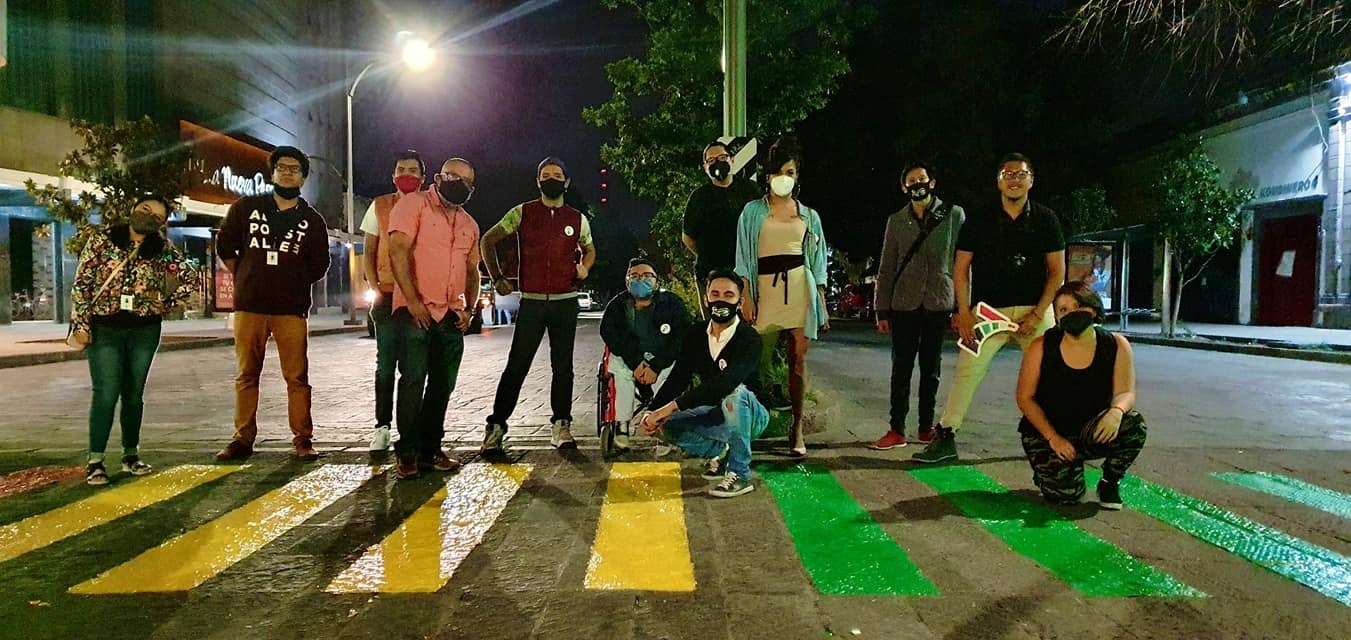
Andrés and colleagues after painting a crosswalk on the main street in San Luis Potosí city in honor of LGBTQI+ pride month.
The government must consider strengthening its commitment to civil organizations in Mexico – we represent excellent, low-cost, social capital. We can reach communities and places that the system and its bureaucratic structures cannot. The only way to achieve true gender equality is with a joint effort of government, the private sector, and civil society.”
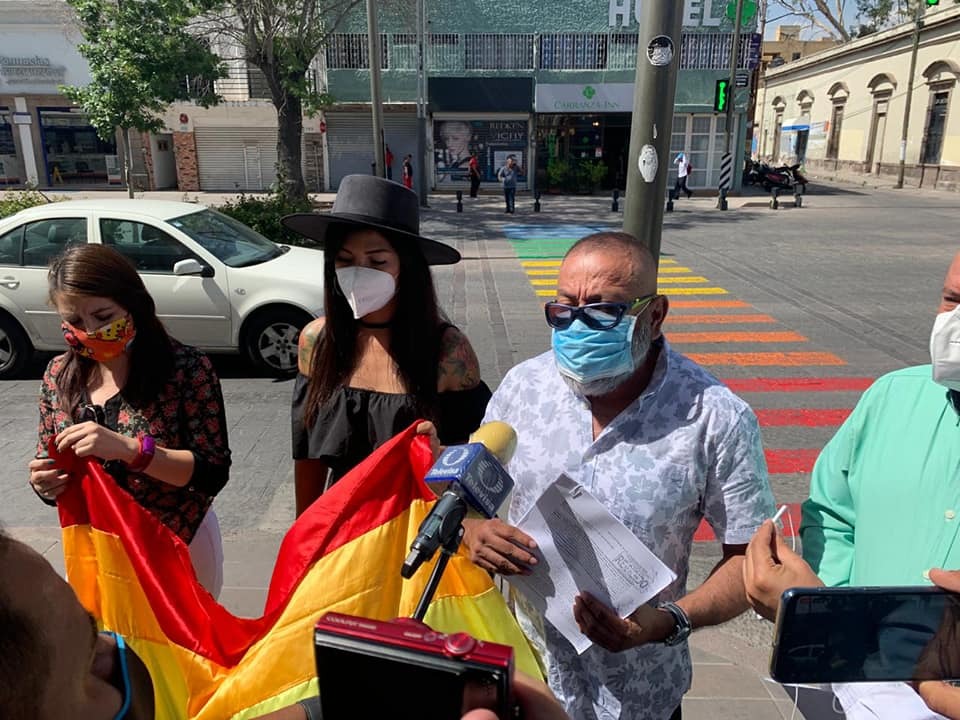
Andrés and colleagues presenting a citizens’ initiative to make San Luis Potosí state’s health laws more inclusive of LGBTQI populations. Photo courtesy of Andrés Costilla Castro and Amigos Potosinos in the Fight Against AIDS.
Guadalupe Arellano Rosas
National President, Asociación Nacional Cívica Femenina, A.C.
Rise Up leader since 2018
“This pandemic is leading us to understand a global paradigm is shifting. It shows the vulnerability of systems that support our quality of life and the urgent necessity of developing systems that reflect the values of community, solidarity, civic engagement, friendship, and family support.
Despite the awful impacts this pandemic has had on us, especially the loss of human lives and the loss of faith in the government’s response, we must find a way to spread good news and bring hope and optimism to those places where one would think there isn’t any.”
HONDURAS
Adriana Belinda Rodriguez
Manager, Paz y Justicia
Rise Up Leader since 2015
“Right now the urgent need is for health care, providing food to those in need, and trying to solve the financial problems that emerge from the COVID-19 situation.
We have organized ways to help families in need of food, and we have launched a ‘purple flag’ campaign with the help of community members who were trained in the prevention of violence. The campaign consists of placing purple flags high on houses and other places within the community to spread the word that women are on alert against gender-based violence.
We must learn to show our best virtues, gifts, and qualities and not allow fear to control our emotions. Better times will indeed come.”
Dunia Perdomo
General Project Coordinator, Organization for Youth Empowerment (OYE)
Rise Up Leader since 2020
“We are currently maintaining weekly communication via telephone and social networks with the population of adolescents, youth, and their families we serve. We have also arranged for supplies to be delivered to this population, since the majority of them have been left with no income. For those who can use the Zoom app, we have organized virtual restorative circles, in which they can voice their emotions and talk about how we can emotionally support each other in our community. We offer different activities including art, communications, physical exercise, and visual design, according to the existence of already established programs. Learning to adapt our work, which has previously relied mostly on in-person interaction, is something we are achieving thanks to our organization’s resilience.”
Anabel Hernandez
Officer, Permanent Commission for Contingencies (COPECO)
Rise Up Leader since 2017
“These days, despite the worldwide crisis, we know that God is with us and that each one of us, from our own little corner can do our bit, and doing so with all our hearts is what matters most.
As Rise Up Leaders, we have met with congresswomen who have gladly donated food that we delivered to a local shelter, where 22 survivors of domestic violence and their children have been sheltered since the pandemic began.”
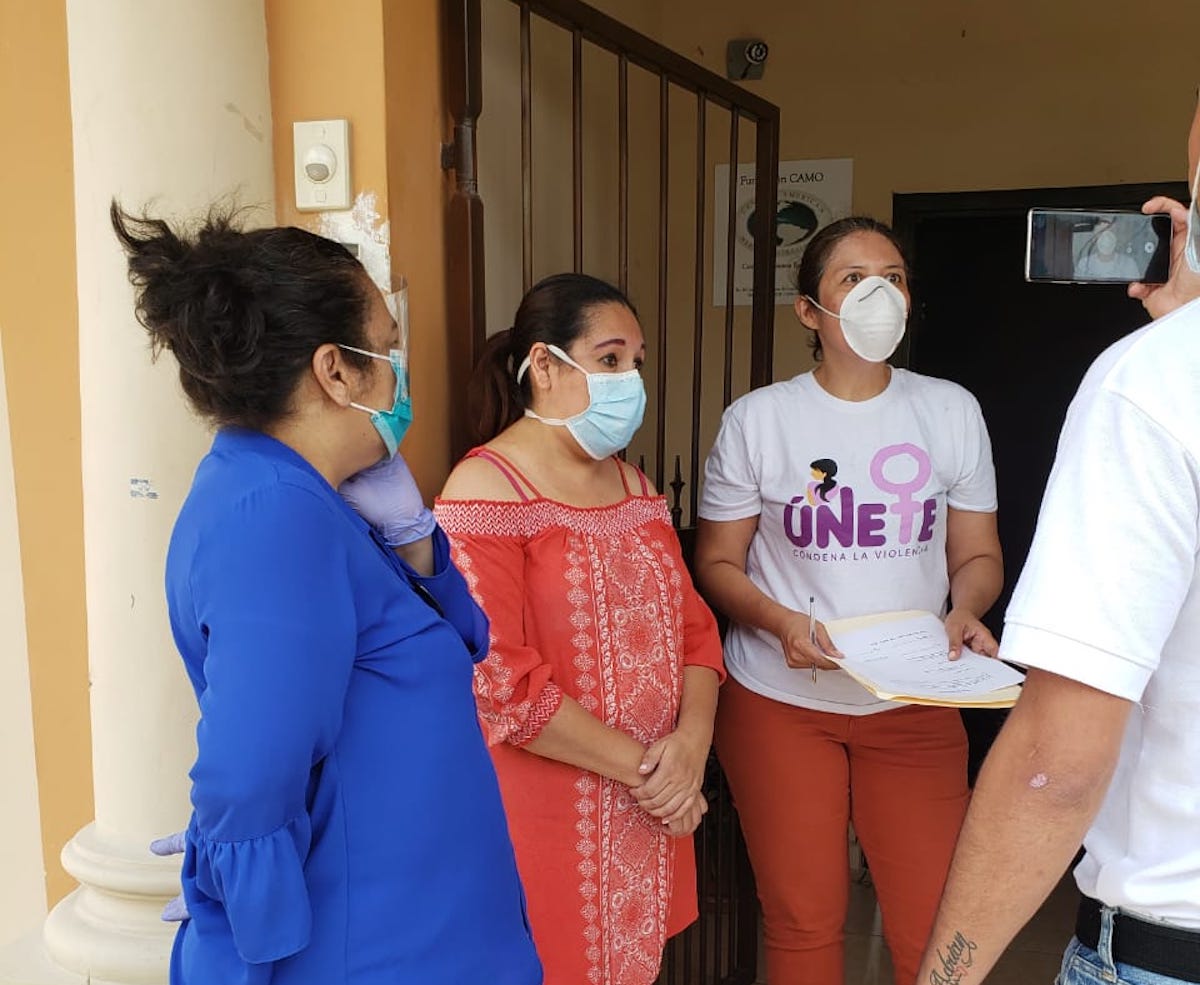
Photo of COVID-19 relief work provided by Rise Up Leader Anabel Hernandez.
Lesly Alfredina Zúniga Martínez
Executive Director, ALFALIT DE HONDURAS
Rise Up Leader since 2020
“We are learning that even countries with the best health systems have been impacted. As a country and as a community, we are not ready for events like this. The most important thing is to be able to educate people to control spreading, and this has been hard.
In times like this, families need to be united — the same goes for people in a community. We need to protect each other and be aware that if rules are set, it is so that we can overcome this together. Our community, and our country, need us.”
For more information about Rise Up Leaders’ work please look out for the next blog on the Rise Up Leaders at the Frontlines series.

